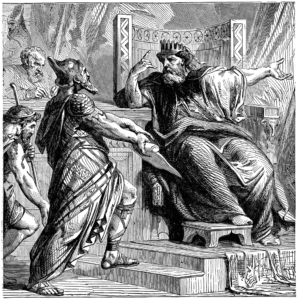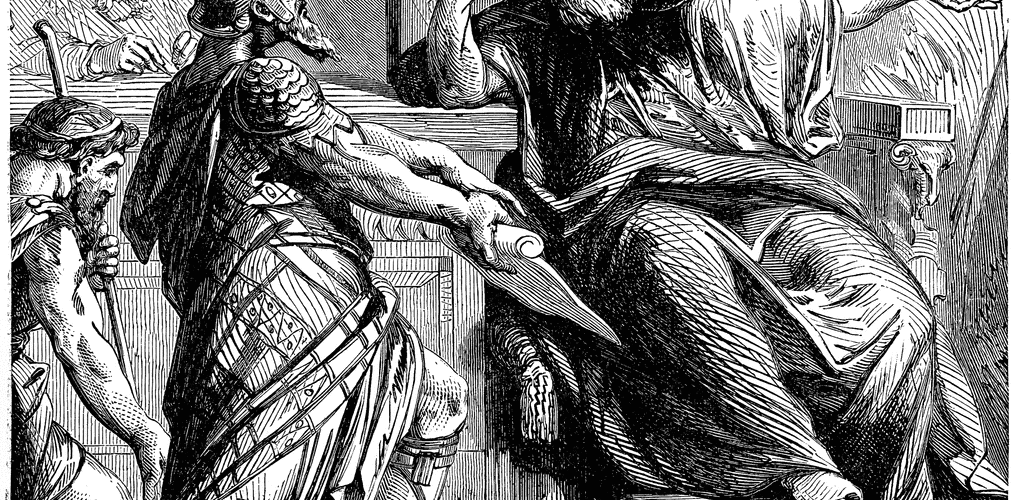David Numbers the People
Podcast: Play in new window | Download
Subscribe: RSS
 TITLE: David Numbers the People
TITLE: David Numbers the People
SUBJECT: Second Samuel
PROPOSITION: In this lesson, we will look at the text of 2 Samuel 24:1-25 and note some lessons.
OBJECTIVE: Our goal is to learn the text of 2 Samuel 24 and make application.
INTRODUCTION:
1. Read: 2 Samuel 24:1-4
2. About the Text:
1) This chapter details the sin of David in numbering the people.
2) This incident takes place close to the end of David’s life.
3) Scholars are divided as to what exactly David’s sin consisted.
4) David, however, knew exactly what he did wrong.
5) There is a parallel account in 1 Chronicles 21 that we will not discuss in this lesson.
3. Ref. to S, T, P, O, and A.
DISCUSSION: When we study 2 Samuel 24:1-25 we see . . .
I. The Text
1. David’s Command (1-4).
1) God’s anger was aroused to move David to number the people (v.1).
2) David commanded Joab to number all the tribes (v.2).
3) Joab asked why David desired it (v.3).
4) The king’s word prevailed (v.4).
2. Joab’s Work (5-9).
1) Joab went north and south to number the people (v.5-8).
2) Joab gave the sum of the number (v.9).
3. David’s Condemnation (10-14).
1) David’s heart condemned him (v.10).
2) He confessed sin and asked for forgiveness (v.10).
3) God sent Gad the prophet to inform of God’s punishment (v.11-12).
4) He gave David a choice (v.13):
a. Seven years famine.
b. Three months of fleeing before his enemies.
c. Three days of plague.
5) David chose to fall into the hand of the Lord, not man (v.14).
4. God’s Plague (15-17).
1) God sent a plague from Dan to Beersheba that killed 70,000 (v.15).
2) He came last to Jerusalem but stopped at the threshing floor of Araunah (v.16).
3) David confessed sin and prayed for mercy (v.17).
5. David’s Payment and Prayers (18-25).
1) God commanded David to build an altar on the threshing floor of Araunah (v.18).
2) David sought to buy the threshing floor and land (v.21).
3) Araunah offered to give it to David (v.22-23).
4) David said, “No, but I will surely buy it from you for a price; nor will I offer burnt offerings to the Lord my God with that which costs me nothing.”
5) David built the altar and offered sacrifices and God listened (v.25).
II. The Teachings
1. David’s sin was on a national level.
1) He involved Joab (v.2).
2) He involved the armies (v.4).
3) He involved the people (v.5-7).
4) He involved the land (v.8).
2. God’s response was on a national level (v.13).
1) All the proposed punishments would exact a penalty nationally (v.13).
2) David chose to fall into God’s hand (v.14).
3) The plague followed the same course as the numbering (v.15-16).
4) Just punishments extend as far as the crime extends – bank robbery driver.
3. David knew he had committed sin (v.10).
1) What was the sin? – Seeking world conquest? Self exaltation? Pride? Boasting?
2) Lack of faith in God for sure, but at a national level.
3) Contrast with Jonathan’s attitude 1 Samuel 14:6 – “Then Jonathan said to the young man who bore his armor, ‘Come, let us go over to the garrison of these uncircumcised; it may be that the Lord will work for us. For nothing restrains the Lord from saving by many or by few.’”
4. God’s nation today is the church.
1) The church is kept pure by the blood of Christ – “…that He might sanctify and cleanse her with the washing of water by the word, that He might present her to Himself a glorious church, not having spot or wrinkle or any such thing, but that she should be holy and without blemish” (Ephesians 5:26-27).
2) She will not be punished like Israel was punished.
3) Jesus Christ rules the nations, however, with a rod of iron – “Now out of His mouth goes a sharp sword, that with it He should strike the nations. And He Himself will rule them with a rod of iron. He Himself treads the winepress of the fierceness and wrath of Almighty God” (Rev.19;15).
5. David would not offer sacrifice for nothing (v.24).
1) What do our sacrifices cost us?
2) Are we like the widow who gives her last mites? (Mark 14:42-44).
3) Or are we more like those who give out of abundance? (Mark 14:44).
CONCLUSION:
1. What can we learn from this story?
1) God takes sin seriously (Romans 6:23).
2) Confession of sin is the best way to deal with it (1 John 1:9).
3) There are consequences to sin that we must face (Galatians 6:7-8).
4) God had an eternal purpose (Ephesians 3:11).
5) Be thankful for Jesus (Colossians 2:14).
2. Invitation

